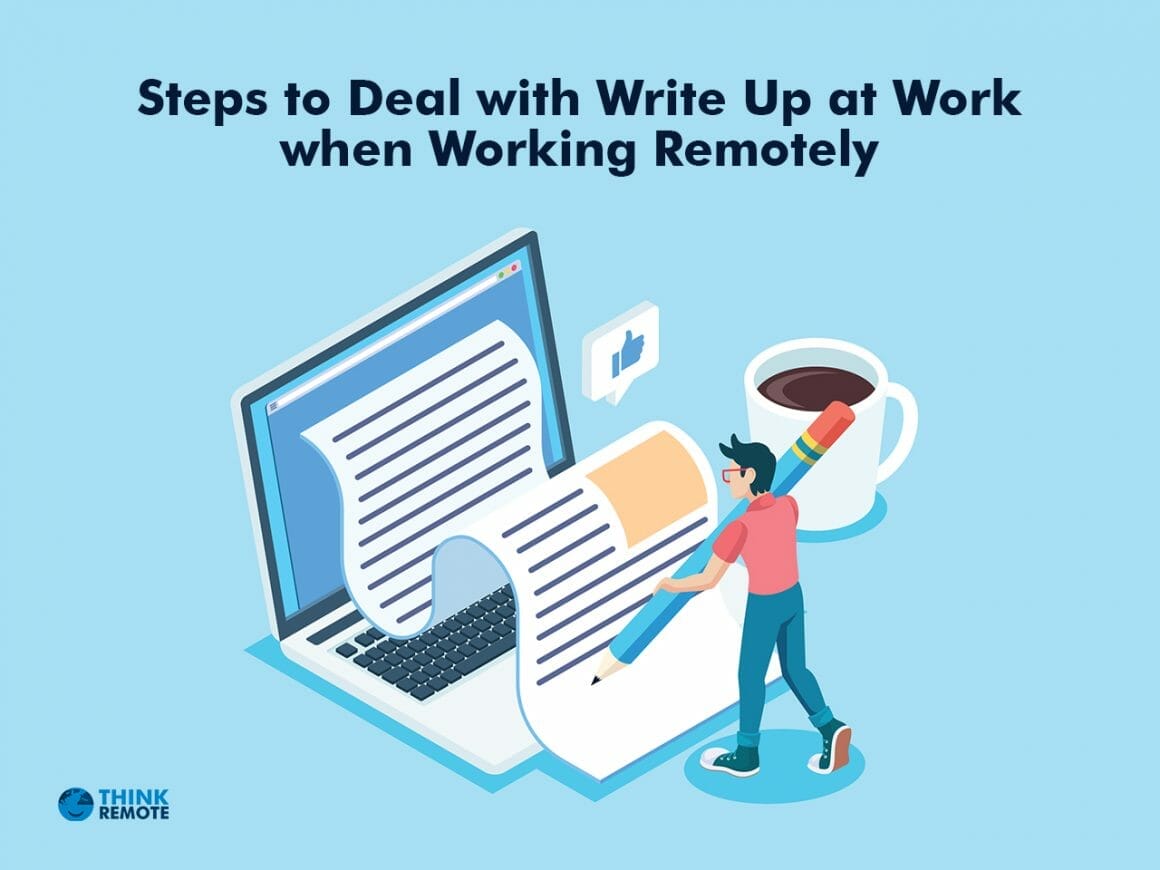“What am I receiving this email for?” This is your first thought if you’ve not really done anything wrong and there’s a write-up sitting in your inbox. What is a write-up can be confusing when you have no idea why disciplinary action is being taken against you, stressful when it’s the second write-up at work, and humiliating because it can make you feel like a failure. It can be even more bothersome when you’re working remotely because you have nobody to talk to in person to understand what went wrong.
If you have received one, don’t worry because, in this article, we will tell you what does it mean to get written up at work and what can you do to deal with that email.
But first things first, what is an employee write-up?
What Is A Write Up At Work?
Being written up at work refers to the process of having a document added to your employee file or records that the HR of your company maintains. Write-ups at work come when one or more of your actions ended up having a negative consequence. It may be performance-related or have gone against some company guideline/policy.
Usually, a verbal warning or dialog can define what is a write-up. If you fail to take the warning seriously, it will result in being written up. This may or may not be the final warning depending on how serious the breach is. This means if you repeat the same mistake, disciplinary action will be taken against you, which often means time-off without pay. You could even get fired.
Most firms call it a “Performance Improvement Plan” (PIP) to not make it sound so dreadful. They probably don’t want to alarm you but subtly let you know that your performance isn’t up to the mark. This PIP could actually be your company’s way of showing you the door.
Why are Write Ups at Work Important?
- Your performance is probably not up to the firm’s expectations
When this is the reason for being written up, then you probably expected it. In this case, the best thing to do is to understand how you can improve if you really want to stay in your current company. We will discuss everything you can do to deal with this write-up later.
- There’s a misunderstanding or miscommunication because you work remotely
Many employees receive a write-up at work because there’s some communication gap between coworkers, which leads to conflicts and blame games, but you’re the unfortunate one who receives a write-up. Let’s be honest; people always have to face challenges at work, but favoritism and internal politics could also be a reason why you’re the one with a write-up.
It’s natural to get enraged if the write-up makes no sense, but that’s not an effective way to deal with any kind of problem. So calm down, and we will get to every possible way of responding to a write-up at work.
4 Steps To Deal With Write-Up Work
If you’re tasked with handling a write-up, here’s how to deal with it:
1. Be Calm

We said calm down right before this, but what happens when you get a write-up at work? And how does one do so after receiving a write-up that doesn’t make sense?
- You want to keep your job.
- You can’t reverse a write up, so yelling at the walls in your house or reacting unprofessionally to the email won’t really solve anything.
Let’s break this no-brainer to you. No matter how you respond, the write-up is done, and there’s nothing you or anyone can do about it now. You can respond, but if it’s filed already, you can’t change what’s in there. Because you won’t be able to stop it once it’s started, the best alternative is to accept it and work with your manager to remedy the faults identified in the PIP.
Things will not go well for you if you respond badly, particularly with rage and denial. If you react negatively, your supervisor will have little sympathy for you and will refuse to assist you to work through the difficulties.
What’s worse? You’re accumulating evidence for a future write-up. Maintain your composure and act professionally, even if you believe the grounds for the write-up are unreasonable.
If you feel strongly about this situation and want to give a rebuttal to the write-up, you very much can approach it professionally. If not, check out these motivational quotes to improve your remote working situation!
Here’s an example of how you can go about it:
With all due respect to your findings and opinions, I would like to humbly disagree with certain points. I’d like to issue a verbal and a written rebuttal to explain the situation from my perspective, which could help clarify some misunderstandings that I noticed in the write-up. I would like the opportunity to address this point-by-point with my version of events.
2. Check The Documentation
Inquire about the documentation regarding your allegedly poor performance or other shortcomings. Reports containing actual figures to back up the company’s performance evaluation should be easy to obtain, but your manager’s record of talks with you might not always be available for you to check.
They should be willing to share their documents with you to assist you in improving if they’ve done their due research and discovered how to write up an employee. If they have a negatively react to you asking for this material, it’s possible that the issues aren’t wholly on your end.
What to do in such a situation?
Honestly, there’s not much you can do here. You can’t break into the HR’s email or their files to know what’s in that document. However, you must know that just asking for the documentation is enough to let your management know that you’re trying to understand the problem to improve. Them not providing the documentation shows there’s something wrong with their side of events.
3. Gather Evidence To Strengthen Your Case

If you feel like you’ve been written up at work without any substantial reason, then you can produce a rebuttal. We gave an example above on how to do that calmly. Before you go ahead, make your case stronger by gathering any evidence you can to support your rebuttal. If you don’t have proof , you will only sound like a grumpy, defensive and self-righteous worker who refuses to work on themselves and doesn’t know how to take feedback positively.
You can avoid this by:
- Gathering evidence for the specific activity you’ve been written up for. For example, if you’re always late to log in to work and that’s the highlight of the write up at work, check all emails where your manager approved your requests and allowed you to log in late. Keep a copy of such emails ready as evidence. Also, check emails where you’ve mentioned the reason for being late.
- When you send a rebuttal email in response to the write up, make sure you attach all the evidence without sounding like you’re blaming anyone. Everything you do in response to a write up should be neutral without pointing any fingers. Evidence is enough to present your case, so maintain your professional tone.
4. Introspect
Before losing your mind, sit back and think about everything that’s written in that email. Before getting your defense mechanism up and running, ask yourself these questions:
- Is every allegation in the email false or a result of miscommunication?
- Is there anything for you to improve on?
- Do you want this job, or is it time for you to move on?
Answering these questions will help you understand if you played any part in receiving the write-up at work. Be honest with yourself and figure out what you need to improve on. This will not only ensure that you’re taking your career seriously and working on your shortcomings but will also help you see an answer to the last question. If you feel like you’re not interested in this job and that’s why you’re slacking, or if the allegations are baseless, you might want to look for another job. Here’s a video that can help you up your productivity:
What Can You Do To Avoid Getting A Write Up At Work?
We talked about what you can do when you’re written up at work. Let’s rewind a little bit. What happened before the write up that led to the write up? Let’s help you fix some things that can reduce your chances of getting those dreaded warnings.
1. Be On Time
When you’re working remotely, it’s easy to lose track of time in more ways than one. You probably have colleagues from different parts of the world. Make sure you convert the meeting timings and check your calendars for tasks. This can save you from missing important meetings and work deadlines.
Check this article for some virtual meeting etiquette tips that can help you maintain professionalism while working from home.
2. Keep Them Informed
If you’re unable to make it to meetings or are unable to submit your work, keep your teammates, and your manager informed. This way, you’re ensuring that their work doesn’t suffer (if it was related to your work) and are also keeping that write up away.
3. Be professional
Whenever you’re dealing with any kind of feedback related to your work or behaviour on an everyday basis, don’t be rude or defensive. Learn to take feedback positively and respond in a calm and polite manner.
It’s also advisable to maintain your productivity to submit high quality work on time and creating a work from home schedule for that can be helpful. Following a good work routine will lead to fewer hiccups in your work and can reduce your chances of being written up for substandard work.
4. Be Mindful of Your Company Culture
Does your company permit you to use casual language and slang? Does your company allow you to choose your working hours? Know what your company permits and doesn’t. It’s best to follow the guidelines and policies your company has laid out for you to avoid a write up.
5. Respect your coworkers
You can expect differences in opinions at your workplace. Remote work comes with people from across the globe. This can be an enriching experience in terms of learning about different cultures, languages, cuisines, etc, but it could also mean conflicting views. Be mindful of how you talk or react during discussions. Respect everyone’s opinion even if you don’t agree with it.
6. Do Your Best
Work hard and follow the instructions of your manager. To produce quality work, you need to be focused and determined. Make the most of your skills and use them to improve your abilities and learn useful practices to maintain a happy work-life. Procrastination and poor performance will warrant a write up over a period of time.
Don’t Panic And Seek Support
Now that you know how to deal with a write up at work, know that you don’t have to do this alone. A write up can be overwhelming for many people because they instantly fear losing their jobs. As said above, stay calm and don’t let anxiety take over. Seek support from close friends and family. They can extend moral support and help you see the positives in the situation. Take legal help in cases where the write up is unjustified and is a weapon to discriminate against you.
Remember that a write-up isn’t a stamp on your work ethic or future, whatever situation you’re in right now. With patience and perseverance, you can always turn things around.
FAQs For Write Up at Work
Can You Be Fired for Not Signing a Write up?
Employers have the power to terminate an employee if they refuse to sign a write-up. Although at-will employment gives employees a lot of leeways for terminating people, there are certain limitations. Employers are prohibited by federal law from discriminating against or firing employees based on their protected status, which includes nationality, race, sex, and religion.
Although wrongful termination is subject to state and federal standards, navigating the legal landscape on your own can be overwhelming and complex. If a worker believes their employer has treated them unfairly, they should seek the aid and counsel of an experienced lawyer.
How Many Write Ups Before You Get Terminated?
Generally, an employee receives three write ups before termination. This number can be different depending on your company’s policies. The termination also depends on the nature of the write-up. If the reason for write up is big like breach of confidentiality or sexual harassment, it can get you fired instantly.
How To Know If You Received An Unjustified Write Up at Work?
If the write-up results from what a coworker said about you or what the manager “thinks” about your performance, then there is something wrong with the write up. A write up needs to have tangible results, or if it’s for misconduct, then there has to be enough evidence to prove so. It needs to be backed by facts and can’t be just someone’s opinion.






